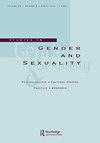Revival of the Fundamental Anthropological Situation: Supervision, Intromission, Trans*, and the Sexual1
Q3 Social Sciences
引用次数: 0
Abstract
ABSTRACT This article focuses on conflicts stemming from the vertical and hierarchically ridden transmission of psychoanalysis through the supervision process. Drawing on a Laplanchian framework, the author argues that the intromission of violent signifiers emanating from the supervisor is liable to alter the supervisee’s idiosyncratic functions and attack their thinking activity. To illustrate this argument, the author recounts his own supervised treatment of a transgender adolescent during which the supervisor–supervisee transference lapsed into a sadomasochistic relationship and a folie-à-deux, leading to the premature termination of both the therapy and the supervision. An initial interpretation of this experience explores the theoretical bias associated with transgender subjectivities, which blinded the supervisor and made him irrationally aggressive. A second post hoc reading of this case reveals the therapist’s own blind spot: his overidentification with the patient and his ensuing need to protect the latter from pathologization. Accordingly, the failed supervision may be viewed as an attack on the third-party function linked to the patient’s psychic organization. Finally, the countertransference madness to which the therapist succumbed with his supervisor can be understood as the unbinding of repressed infantile sexuality and the reenactment of paradoxical messages intromitted to the patient’s body ego by his parents.人类学基本情境的复兴:监督、渗透、跨性与性
摘要:本文关注的是精神分析在督导过程中纵向和层次化的传播所产生的冲突。在拉普朗契框架的基础上,作者认为来自督导者的暴力能指的输入可能会改变被督导者的特质功能并攻击他们的思维活动。为了说明这一论点,作者叙述了他自己对一名跨性别青少年的监督治疗,在治疗过程中,监督者与被监督者之间的移情变成了一种施虐受虐关系和一种愚蠢的行为-à-deux,导致治疗和监督都过早终止。对这一经历的初步解释是,与跨性别主体性相关的理论偏见蒙蔽了主管的眼睛,使他变得非理性地咄咄逼人。对这个案例的第二个事后解读揭示了治疗师自己的盲点:他对病人的过度认同,以及随之而来的保护病人不被病态化的需要。因此,失败的监督可能被视为对与患者精神组织相关的第三方功能的攻击。最后,治疗师和他的导师屈服于反移情的疯狂,可以理解为被压抑的婴儿性行为的解除,以及父母向患者身体自我灌输的矛盾信息的再现。
本文章由计算机程序翻译,如有差异,请以英文原文为准。
求助全文
约1分钟内获得全文
求助全文
来源期刊

Studies in Gender and Sexuality
Social Sciences-Gender Studies
CiteScore
0.80
自引率
0.00%
发文量
15
期刊介绍:
Beginning in the final two decades of the 20th century, the study of gender and sexuality has been revived from a variety of directions: the traditions of feminist scholarship, postclassical and postmodern psychoanalytic theory, developmental research, and cultural studies have all contributed to renewed fascination with those powerfully formative aspects of subjectivity that fall within the rubric of "gender" and "sexuality." Clinicians, for their part, have returned to gender and sexuality with heightened sensitivity to the role of these constructs in the treatment situation, including the richly variegated ways in which assumptions about gender and sexuality enter into our understandings of "normality" and "pathology."
 求助内容:
求助内容: 应助结果提醒方式:
应助结果提醒方式:


